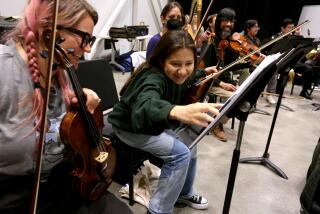MUSIC REVIEW : Violinist Vengerov Returns and Conquers
- Share via
Mightily impressive at two earlier Southland appearances, when he played the Tchaikovsky Concerto with Russian and American orchestras, the Mongolian violinist Maxim Vengerov returned Friday night to give his first local recital.
Not surprisingly, given his remarkable successes on tour with the Moscow Philharmonic in April, 1992, and, seven months later, as guest with the L.A. Philharmonic, Vengerov swept all before him at this more faceted challenge, that of holding an audience for an entire evening with musicality, personality and virtuosity. In Royce Hall at the UCLA Center for the Arts, Vengerov, with pianist Revital Hachamoff, showed that his gifts and his accomplishment are neither flukes nor shallow.
He is the real thing: a born virtuoso with a stunning facility, technique to burn, emotional versatility, communicational skills and even a sense of humor. Only incidentally, he turned 19 just two months ago.
Of course there will be a deepening of his musical comprehension and his ability to project all his interpretive decisions in years to come. Nevertheless, right now, Vengerov has the resources to compete and to conquer with his present musical persona.
What he played best--and he played nothing less than convincingly--was Prokofiev’s kaleidoscopic, oft-neglected Sonata No. 1, a demanding work of large emotional scope and myriad technical hurdles. For Vengerov, it seemed as natural as speech, as fluent as quiet conversation or noisy discussion; one heard the extremes and the depths of the composer’s feeling. The same could be said for Prokofiev’s shorter, but very cherishable, Five Melodies, Opus 35.
Less idiomatic but nonetheless pleasing were the readings by Vengerov and Hachamoff--she played efficiently but blandly--of sonatas in A by Mozart and Brahms. In terms of thrilling the usually staid Royce Hall audience, the best came last, in Wieniawski’s potent showpiece, the Polonaise in D--causing loud cheers--and in two encores, Bazzini’s dazzling “Ronde des Lutins,” and a Melody by Tchaikovsky.
More to Read
The biggest entertainment stories
Get our big stories about Hollywood, film, television, music, arts, culture and more right in your inbox as soon as they publish.
You may occasionally receive promotional content from the Los Angeles Times.










